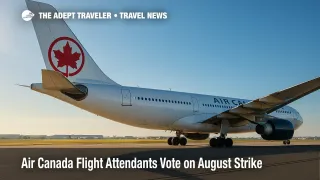Air Canada Flight Attendants Vote on August Strike

Air Canada travelers could face turbulence that has nothing to do with weather. More than 10,000 flight attendants stationed at Toronto Pearson (YYZ), Montréal-Trudeau (YUL), Vancouver (YVR), and Calgary (YYC) are voting through August 5 on whether to authorize a walkout. If the mandate passes, the Canadian Union of Public Employees (CUPE) could launch a legal strike as soon as August 16, after a mandatory 21-day cooling-off period. Negotiations continue, but both sides remain far apart on wages and unpaid labor. Two minutes of planning now could spare you hours of frustration later.
Key Points
- Why it matters: A strike could disrupt about 1,100 daily Air Canada flights.
- Travel impact: Earliest legal walkout date is August 16 after cooling-off period.
- What's next: Vote results expected August 6, triggering intensive mediation.
- CUPE says entry-level attendants earn $1,951.30 a month.
- Air Canada posted $3.586 billion in adjusted EBITDA for 2024.
- Union's "Unfair Canada" campaign targets unpaid ground duties.
Snapshot
CUPE opened its strike-authorization ballot on July 28, citing stagnant pay and 35 hours of unpaid work each month for pre-boarding, deplaning, and safety checks. Internal polling shows 92.3 percent of members favor job action. Air Canada frames the vote as routine and stresses that talks remain active under federal mediation. No flights are canceled yet, but travelers booked for mid-August should prepare contingency plans, including flexible tickets and updated travel insurance.
Background
Flight attendants have worked under a 10-year agreement that expired March 31, 2025. While Air Canada's 2024 revenue hit $22.255 billion and adjusted EBITDA reached $3.586 billion, the union argues pay scales have not kept pace with inflation. Entry-level full-timers earning $1,951.30 a month fall below the federal minimum wage when unpaid hours are factored in. The dispute feeds into CUPE's wider "Unfair Canada" push to amend the Canada Labour Code and end uncompensated labor across the airline sector.
Latest Developments
Strike Vote Nears Deadline
Balloting closes at 6 p.m. ET on August 5. If a simple majority approves, CUPE can file a 72-hour strike notice beginning August 13, putting the earliest walkout on August 16. Mediators from the Federal Mediation and Conciliation Service will remain on standby during the 21-day cooling-off period. Analysts warn that even the threat of a strike could trigger schedule reductions as Air Canada seeks to preserve crew duty-time limits and protect long-haul connectivity.
Air Canada Says Talks Continue
In a statement, the airline called the vote "a normal step in collective bargaining," noting it successfully concluded a pilot contract earlier this year without operational disruption. Management insists progress is possible before mid-August, but has not publicly addressed unpaid ground duties. The carrier urges customers to sign up for flight-status alerts and promises "good-faith bargaining to reach a fair deal."
Analysis
The looming walkout underscores a broader industry reckoning over how flight attendants are paid. U.S. carriers such as Delta now compensate boarding time, pressuring Canadian airlines to follow. CUPE's strategy mirrors recent UAW and Teamsters campaigns that used aggressive strike mandates to secure record gains. Air Canada, buoyed by robust international demand and a pilot deal that averted disruption, may feel it can weather limited labor unrest. Yet summer is peak season, and a protracted strike would ripple through code-share partners, regional feeders, and global alliances. The government could intervene with back-to-work legislation, but Ottawa has preferred letting market forces resolve disputes unless national supply chains are threatened. For travelers, the key takeaway is flexibility: choose refundable fares, keep an eye on alerts, and know EU261 and Canadian Air Passenger Protection regulations if rerouting becomes necessary. Lastly, the union's push dovetails with Bill C-415, which would mandate pay from check-in to cabin secure, a change that could reshape labor economics across all Canadian carriers.
Final Thoughts
Whether or not CUPE members walk off the job, the vote shines a spotlight on unpaid labor practices that many consumers never see. Travelers booked on Air Canada after August 16 should monitor union updates, airline advisories, and third-party apps, then build backup plans accordingly. A little foresight today could keep your itinerary intact if the Air Canada flight attendant strike materializes.
